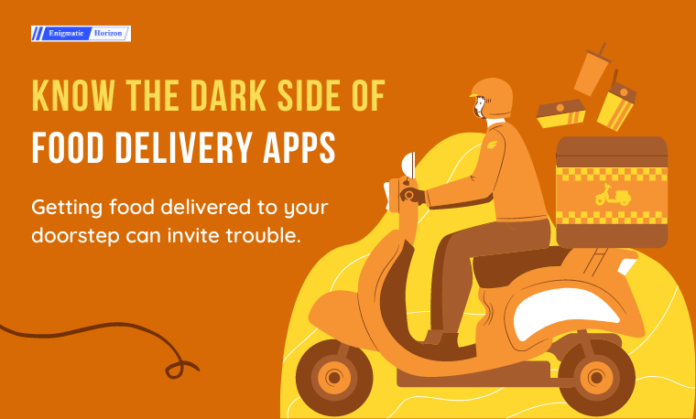Priyal Dholakia – Enigmatic Horizon Staff (Assistant Editor)
Isn’t it great that we can now order and relish the best delicacies right from the comfort of our homes? Be it us craving our favourite food or the hoteliers getting bored of their drab food at the canteen, food delivery apps like Swiggy and Zomato are what we today reach out for.
These apps prove to be a go-to solution whenever we crave something delicious but are unable to go out. We can savor delicious food from the best restaurants while sitting at home with family and friends. We can serve impressive and mouth-watering meals to guests with just a few taps on our mobile screen. For working professionals, these apps prove to be no less than an instant solution to all their worries. While they are grappling with the pressures of their hectic work schedules, these apps are able to get them their feast right at the dinner table. Nowadays, these apps deliver to remote locations as well. They are a rage among youngsters who can order food of their liking anytime, be it to satiate their mid-night cravings or enjoy a party.
Not only customers, but restaurant owners also reap the benefits of these delivery apps. It provides them with extensive reach among customers who frequently order from the restaurant. Also, it helps their revenue grow smoothly on the same investment.
Another significant benefit of these apps is their deals and discounts. Huge discounts are offered to regular or frequent customers. It also helps customers explore new restaurants and new food items every day.
The food delivery industry has emerged as one of the largest online platforms in the past decade. It has led to the emergence of many big players in the market, such as Uber Eats, Foodpanda, Swiggy, Zomato, etc. These platforms are providing employment to a large number of people on a mass scale. Nowadays, women can also be seen working as delivery personnel.
According to the most recent survey, the highest number of food orders per day were between the age groups of 25 and 34 years old. You would be surprised to know how much money customers spend ordering food online. Zomato revealed that a loyal customer in Pune spent 28 lakh rupees on food in the year 2022. They also revealed that the most ordered food was biryani. Zomato comes in second with 1.2 million daily orders, while Swiggy receives 1.5 million.
But the food delivery industry is not entirely laden with benefits. There is a potential dark side to it as well. Let us examine and take a closer look at the disadvantages of the food delivery industry.
Nowadays, people rely on food delivery apps to such an extent that they have forgotten about the joy and skill of cooking. Cooking is an essential life skill everyone needs to learn to sustain themselves. But most people have made themselves so dependent on these delivery apps that they have forgotten what it is like to cook a meal for themselves. Moreover, we see that with the rise of these food delivery portals, fewer people actually go out or enjoy their dining experience at a restaurant. Relying excessively on technology can thus hamper our life skills and take a toll on our social lives.
Another disadvantage of online food delivery is the quality of food it offers. Most of the time, the food is stuffed and packed in plastic bags. Furthermore, if the delivery distance is too far, then the food tends to become cold. This can, in turn, damage the quality of the food.
The next disadvantage is that not all restaurants maintain hygiene in food preparation. This can give rise to a variety of health concerns, like gastrointestinal and digestive problems. Food that is ordered from outside is usually high in fat and cholesterol content. This can pose a serious threat of obesity as well. Obesity in turn can invite a whole lot of other health problems like diabetes, cardiac issues, and the like.
Hence, online food delivery platforms should be used only when there is a need to—that is, when we are running short of time or are unable to cook food due to some other reason. People should refrain from making it a regular habit. Over-reliance on these delivery platforms is only going to cause us more harm than good in the long run.
